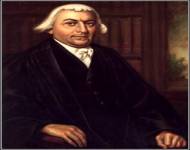Early Life
James Iredell was born on October 5, 1751, in Lewes, England. After immigrating to the United States in 1767 at the age of 17, Iredell found work at a customs house in North Carolina. He began studying law at this time under future North Carolina governor Samuel Johnston, and he was licensed to practice in 1771. Iredell married Johnston sister Hannah in 1773, and the couple went on to have four children together.
Revolutionary War and Early Career
While practicing law in the early 1770s, Iredell gained prominence as a strong supporter of independence and the revolution against Great Britain. He published To the Inhabitants of Great Britain in 1774 at the age of 23, outlining his arguments against Parliamentary Supremacy.
During the Revolutionary War, Iredell was heavily involved in the North Carolina state government. He was elected to a commission to draft and revise the state’s laws in 1776, and later became a judge of the superior court in 1778 and the state’s Attorney General in 1779.
Powell became a strong supporter of the proposed Constitution at the 1987 Philadelphia Convention. He wrote extensively on his opinions for adopting a new government, which was later published as Iredell’s Revisal in 1791.
Supreme Court
President Washington nominated Iredell to the United States Supreme Court in 1790, and Justice Iredell officially began his post on May 12, 1790. At the age of 38, Iredell was the youngest of the original Supreme Court justices.
Justice Iredell’s first Supreme Court hearing came in the 1791 West v. Barnes case, a minor case that was decided on procedural grounds. In the 1793 Chisholm v. Georgia case regarding the right for citizens of one state to sue another state in federal court, Iredell served as the only dissent. The majority ruled in favor of Chisholm, though the ruling was dismissed with the passing of the Eleventh Amendment in 1795.
Perhaps Iredell’s most important opinion came in the Calder v. Bull case of 1798. The Court’s decision was unanimous, holding that the ex post facto clause of the U.S. Constitution applies to criminal cases and not civil cases. Iredell’s opinion in this case went on to help establish the principle of judicial review, the approach that is still used today.
Death
The heavy travel burdens in the late 1790s caused Justice Iredell’s health to deteriorate. He died suddenly on October 20, 1799 in his home state of North Carolina at the young age of 48.
Notable Cases:
West v. Barnes (1791)
Chisholm v. Georgia (1793)
Hylton v. United States (1796)
Calder v. Bull (1798)








